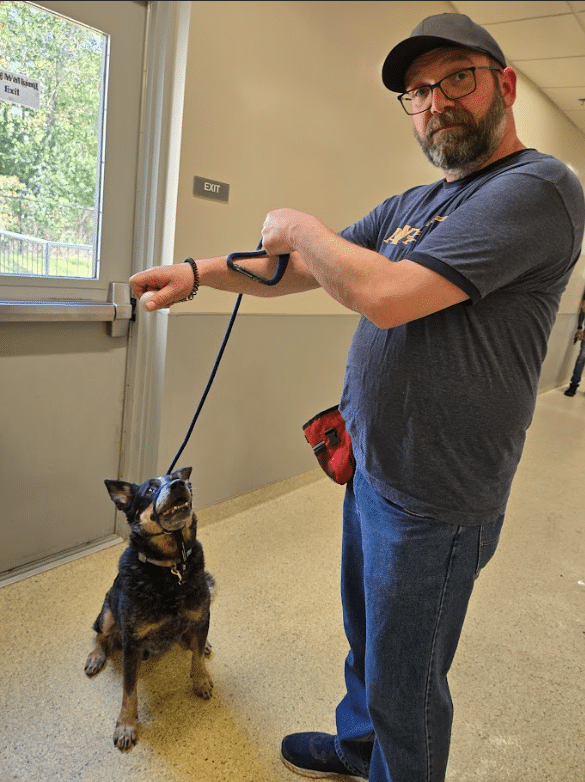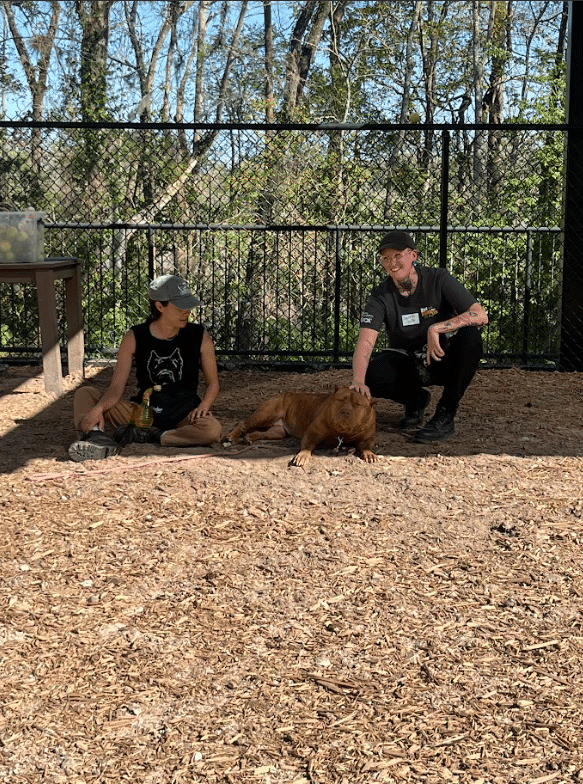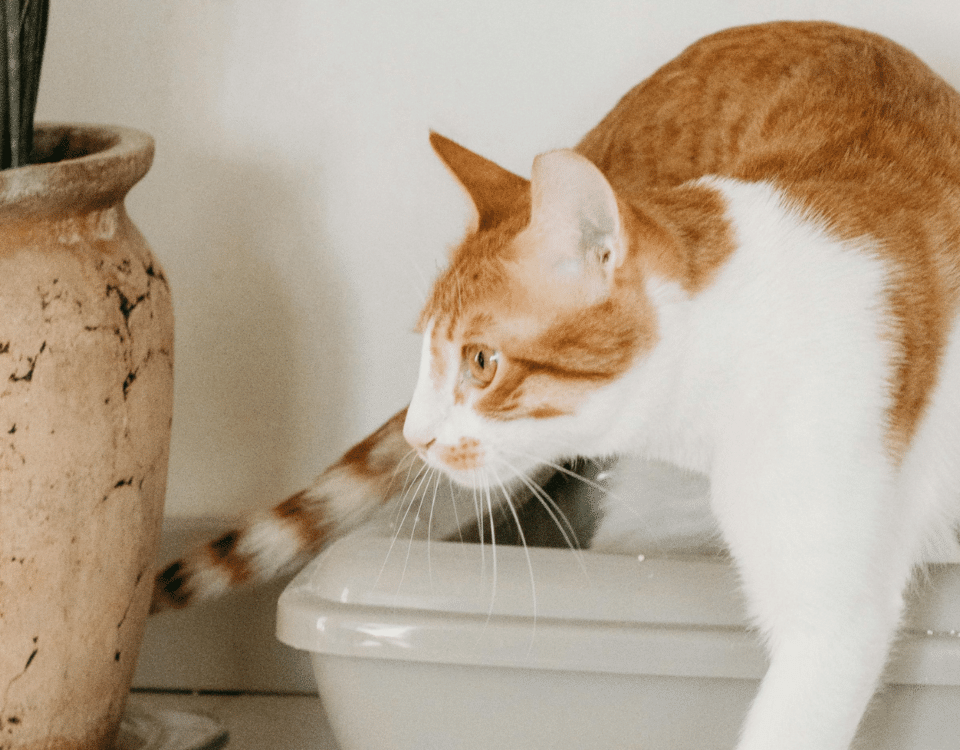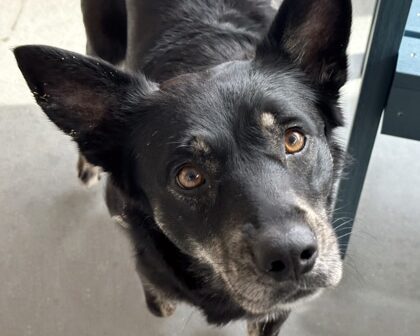At Animal Welfare Association we are always searching for ways to improve the lives of our shelter dogs. Recently, members of our team attended Dogs Playing for Life, a mentorship teaches shelters how to use playgroups to enrich dogs’ lives, reduce stress, and improve social skills.
Jenna Barrett, our behavior assistant, and Rob Snyder, our animal care supervisor, joined the Dogs Playing for Life mentorship program. It was an exciting opportunity for them, and they came back with great insights, new energy, and a clear plan. This plan shows how AWA can improve our dogs' experience with structured playgroups.
What is Dogs Playing for Life?
“Dogs Playing for Life teaches how to introduce many dogs to a playgroup. It shows what behavior is okay and when to step in," Rob explained.
Dogs in shelters often feel stress, frustration, and depression. They spend long days in kennels. Playgroups let them interact naturally. This enriches their experience and boosts both mental and physical well-being. Playgroups let staff see dogs' real personalities. Dogs can show their true selves beyond just kennel behavior. Instead of only judging them for being shy or too excitable, we should look deeper.
"We learn more about a dog's social status in the groups," Jenna added. "We learned to let dogs be dogs and let them communicate with each other appropriately."
Through these playgroups, dogs build confidence, release extra energy, and feel happier and more relaxed in the shelter.
Learning Hands-On Playgroup Management
Before the mentorship, Rob wanted to learn more about playgroups and how to manage them well.
"I was hoping to learn more about playgroups and how to successfully manage them," he said. "All of the hands-on training was incredibly valuable."
In the shelter environment, dog interactions can sometimes be unpredictable. The mentorship taught Rob and Jenna when to intervene and when to allow the dogs to work things out on their own.
"Let dogs correct one another, when possible," Rob noted. "That was one of the biggest lessons. We sometimes step in too early, but dogs are good at communicating with each other. Learning when to let them handle it and when to step in was huge."
Another key skill Rob focused on was better leash handling. Good leash skills are key. They help move dogs in and out of playgroups safely. They also improve overall shelter life. Rob wants to teach kennel manners. This will help dogs behave better when people enter their spaces.
"Rob said it's important to improve cage presentation. This means entering the cage with each dog. Improving kennel manners helps dogs show their best side to adopters. It also makes handling safer for staff."


Reducing Stress & Making Better Adoption Matches
Jenna had high hopes for what this program could bring to AWA.
"I thought it would lower stress, cut down on kennel stress meds, and save on medical costs," she said. "I wanted calmer, happier, and healthier dogs because a healthy mind equals a healthy body."
Jenna found it thrilling to use playgroups. They helped shy or scared dogs feel more comfortable. Scared or withdrawn dogs can take weeks to adjust. However, if you introduce them to playgroups early, they can decompress more easily.
Jenna said letting the public watch playgroups reveals dogs' real personalities and energy. This will help find better adoption matches. Plus, getting staff more active with groups builds their confidence in dog-to-dog interactions. It should be the 'fun part' of the job while also expanding their knowledge and skills.
The goal is for staff to gain confidence in managing playgroups. Then, these sessions can become a regular and valuable part of daily shelter life.
Watching Shut-Down Dogs Come to Life
Jenna and Rob thought watching scared or shut-down dogs play in a group was very rewarding.
"They don’t wait to introduce new dogs. They put them in a playgroup right after they arrive. This helps reduce stress and fear from being in a shelter," Jenna explained.
A great strategy from Dogs Playing for Life is that every dog can join playgroups, regardless of their social skills.
"They use muzzles to help socialize dogs! "Every dog gets time in a group. This is true even if they are muzzled. It can be just one other dog. Sometimes, the dogs might not interact at all. It can last for 5 to 10 minutes," Jenna said.
Rob also reflected on how tired and satisfied the dogs were after playgroups.
"After our first Rough and Rowdy playgroup at AWA, every dog in the group was fast asleep for over an hour," he said. "The whole adoption room was silent. It just proved how much playgroups affect their kennel presence and how much it tires them out."
Key Takeaways
Both Jenna and Rob came back with game-changing insights:
- Organizing Playgroups into Two Big Categories Works Best
- Rough and Rowdy Group: High-energy, physical play, grappling.
- Gentle and Dainty Group: Lower energy, less play, great for fearful or shut-down dogs. - Every Dog Can Play...Even Muzzled or Selective Dogs
- Playgroups aren’t just for easygoing dogs. Even dogs with behavioral challenges benefit from structured playtime. - Better Handling & Training Improves Shelter Life
- Rob said that good leash handling, kennel manners, and cage presentation help both staff and dogs. - Let Dogs Communicate Naturally When Possible
- "We had to learn when to step in and when to let the dogs figure it out themselves," Jenna explained. "Dogs naturally communicate. When they interact freely, they learn important social skills."
Challenges & Adjustments
Of course, implementing a new program comes with its challenges.
"Breaking bad or old habits was tough," Jenna admitted. "Getting used to big groups, like the Rough and Rowdy, can be tough. Arguments between dogs can heat up quickly. And getting everyone in multiple departments on the same page was a challenge."
With time and experience, these challenges will get easier. The benefits will keep growing.
What’s Next? Puppy Playgroups & More!
Jenna and Rob want to grow playgroups at AWA. They’re excited to add special sessions for puppies.
"After we talk with Dr. Emily about it, we’d love to do puppy playgroups," Jenna said. "Puppies can play with other puppies (5 months and younger) or with suitable adult dogs. This helps them learn appropriate play behaviors and what's not acceptable."
Puppy playgroups can greatly help young dogs socialize. This early interaction sets them up for success as they grow.
Rob summed up his experience with Dogs Playing for Life in one sentence: "Overall, it was a one-of-a-kind learning experience, and I’d recommend it to anyone who has the chance to do it."
Dogs Playing for Life has transformed how AWA manages play, socializing, and stress relief for shelter dogs. Jenna and Rob's hard work is already helping our dogs with these new techniques.
Come see a playgroup in action. Witness how Dogs Playing for Life is changing our shelter dogs’ lives.





